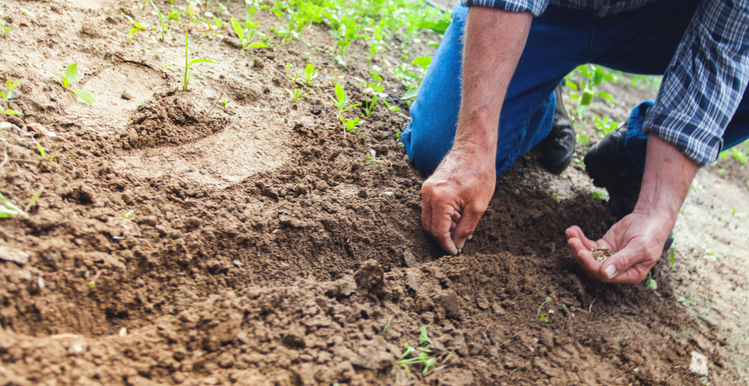
A thoughtful summer garden cooks up all kinds of delicious possibilities—and some without cooking at all. Keep reading for tips on how to grow delicious garden salads all summer long.
Salad Greens
Iceberg lettuce, spinach, arugula, collards—green leafy vegetables are the base for many summer salads, so make sure to plant enough to keep some in constant rotation. We like to plant ours in rows about a week apart, so there is always some at the peak of freshness and flavor. Salad greens prefer rich, loamy soil with plenty of compost and organic matter and enjoy full to partial sun, so prep your plot accordingly.
Use kitchen shears to cut the leaves to about 1 inch above soil level and use a salad spinner to carefully loosen and remove dirt from the leaves. Plants will keep growing back as long as conditions are favorable (and flavor-able).
Carrots
One of the best vegetables to grow with children, carrots love well-drained soil and lots of sun. They can take two to three months to fully mature, so make sure to plant well in advance of the last predicted frost. We find raised garden beds are best for carrots as they don’t need to fight stones and hard ground as they push into the dirt; they are also a little easier to pull when the soil has been properly amended. Try different varieties of carrot to change up the flavor and color of this lunchbox favorite.
Tomatoes
No salad is complete with homegrown tomatoes, and no summer is either. A strong tomato crop starts with strong plants that have access to consistent water, six to eight hours of full sun, a trellis or support system, and protection from wind, squirrels, and bugs. There are many varieties to choose from, so pick your favorite based on your location, available space, and appetite. Once you’ve had a warm tomato from the vine, you’ll be hard-pressed to find a conventional one with equal flavor and texture; there really is nothing quite like it.
Peppers
Hot, sweet, or bell, peppers are one of the easiest garden plants to grow in the summer time. They love hot, sunny weather and rich, clean soils, and they do quite well for themselves even if neglected from time to time. Like tomatoes, peppers are best started as plants; their seeds need help and plenty of time to grow into prolific producers. Peppers can be picked at various stages of ripeness to change up their color and flavor.
Onions
Onions are also an easy plant to grow, and they are great for raised beds, which offer the drainage these layered flavor balls need. Plant more onions sets than you think you’ll eat; smaller younger plants can be eaten as scallions. Onions offer the added benefit of being ever-so-slightly repellent to deer, and their uniform growth makes them a great border plant for urban gardens.
If you’re the type of person who believes salads are what your food eats, it can be difficult to round out your plate with produce. That said, there is nothing like homegrown vegetables ripened in your own backyard to take a bite out of what’s good for you.
Who knows? You may even go back for seconds.
If you are growing your summer garden and having difficulty keeping those pesky insects away - try using an effective insecticide. A product like Compare-N-Save Insect Control can help reduce bothersome pests on around your patios, fire pits, and walkways, as well as any other place in your yard or home without the need for additional plants, upkeep, or landscaping.
Learn how other Ragan & Massey products can help with insects or your other gardening needs.
